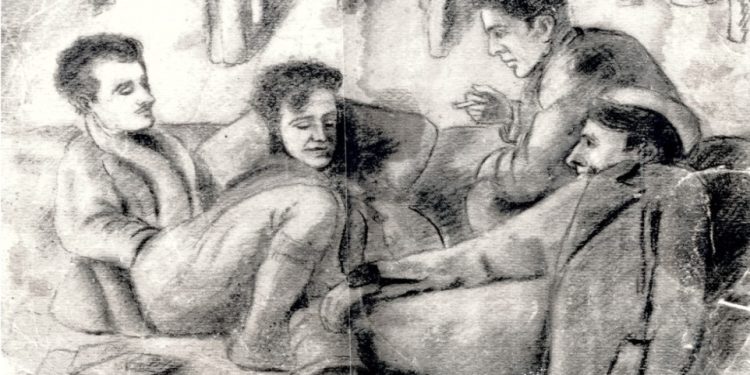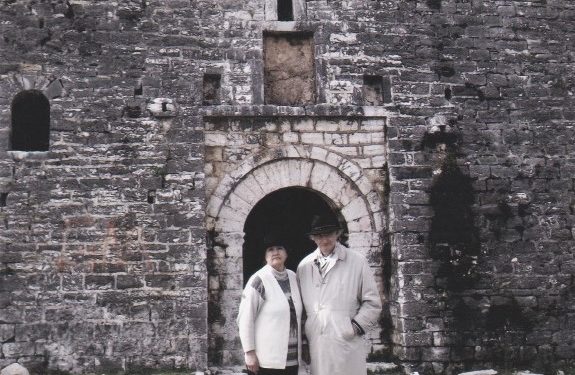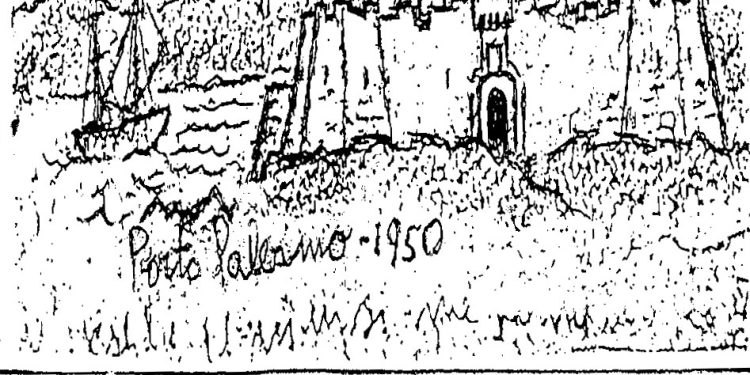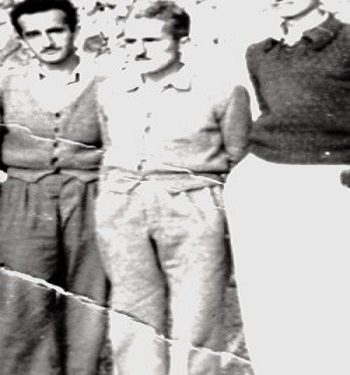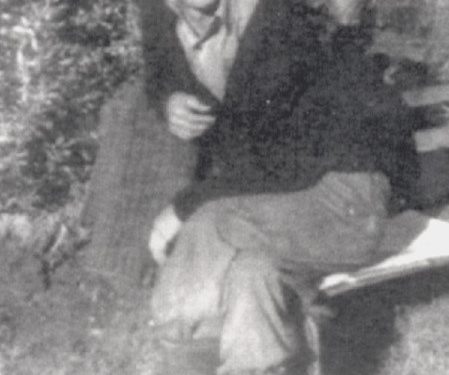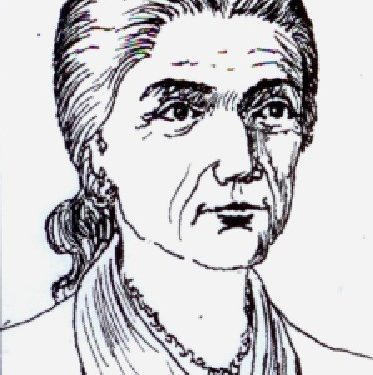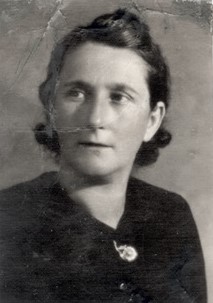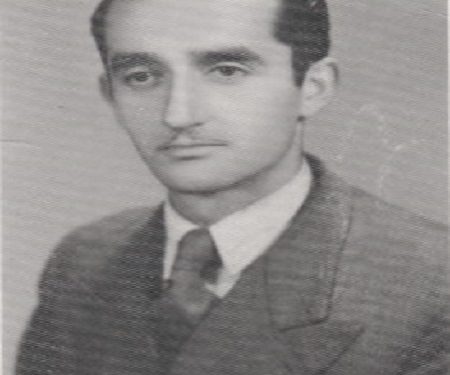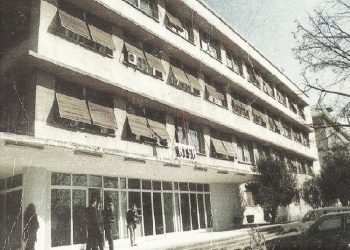By Lek Pervizi
Part Fifteen
THE ODYSSEY OF INNOCENCE
To my brother Valentin, who endured?
47 straight years of the ideological storms of
communism, moreover, separated
from his wife, a true Odyssey
in the middle of the twentieth century.
Memorie.al / When you enter Skuraj and cross the Urdhaza stream, the mountain climb begins, on the hill called of the Lekbibajs. You pass in a row the three mills known as Gjin Pjetri’s, which rise one after the other. You also pass the two-story tower of Ndrec Pjetri, Gjin’s younger brother, and then you encounter a rocky ridge on which stands a complex of three stone buildings, the historic towers known as the towers of Gjin Pjetër Pervizi of Skuraj, the leader of the Kurbin uprising. These buildings dominate the entire valley, which is formed by the confluence of the Mat and Fan rivers (a tributary of the Mat), up to Milot. It is almost a fortress, which protects and defends the area from the expeditions of foreign invading armies that could penetrate through that gorge, until they met the wall of the Skuraj Mountains, where the towers we mentioned were erected.
Continued from the previous issue
From the “frying pan” into the fire!
When we were thrown into the fortress-prison of Porto-Palermo, we found several of the most important families of the north locked up in that medieval fortress, such as; Gjomarkaj, Pervizi, Bajraktari, Dine, Dema, Ndreaj, Topalli, Mirakaj, Kolaj, Spahia, Sinaj, Shehaj, etc., families of chieftains from Mirdita, Malësia e Madhe, Puka, Lezha, etc., and women and children, old men and women. There we found our mother and our cousin, Bardha Gjomarkaj, who had met Valentin the same day he arrived in Shkodra from Italy. A week didn’t pass before all the families were taken away and sent to the Tepelena camp. The fortress of Porto-Palermo was turned into a prison for men only.
Not with sentences from any court but, thrown inside by the State Security. Only darkness and humidity reigned there. They assigned Valentin and me to a large room, 10 x 5 meters and 6-7 meters high. The light barely entered from a window at the end of a tunnel, three or more meters deep, which was the thickness of the wall. In that room like the cave of the cyclops Polyphemus, they assigned us a place at the end of it, on the east side, right on stone slabs. There, 20 people were laying side by side, with a passage in the middle, one after the other, with their heads to the wall and their feet facing each other. We immediately got to know them.
Across from us were Vasil Kokali, a young man from Saranda, and Shpend Sherifi, a former lieutenant from Tropoja, who had been in Shkodra prison with Valentin. Then came in order; Luigj Marku, Luigj Hila, Avni Agolli, the two Çullhaj brothers, Bajram Xhaferri, Sherif Tafani, and others I don’t remember, I mean for our room. From the others in that fortress, there were; Haziz Kurjani, Kujtim Velmishi, Piro Mavromati, Xhevit Matjani, Bexhet and Haziz Ndreu, Zef Gjoka, Seit Ukaj, Cen Golja, the Dushi brothers, the eldest of whom, Deda, was our baker, because the bread was baked in the fortress oven.
We were in conditions of complete isolation. A truck would pass, or not pass, once a month, on the Vlorë-Saranda road. When they brought Valentin and me here, the car left us in Himara, at the police post, where we slept that night under the stars. The next day, our bundle of clothes on our backs, and on foot, to the Fortress, accompanied by an armed Security officer. With our confinement in the Porto-Palermo Fortress, Valentin was cut off from any connection with his wife. Not only that, but even if he wanted to write, there was no paper, no envelope, no postcards, so to speak. Without any income or other help, we lived only on the spiral soup from the cauldron, of which we were given one spoonful a day, and a piece of mushy bread, made of rye.
It became such a problem that it was decided to reduce the ration, from 650 to 400 grams, but baked in a brick oven. At least we would eat bread and not mush. People were weak from the lack of food. Half of the prisoners were blinded by a lack of vitamins, such as; Ndue Dushi, Mark Dushi, Tomorr Dine, Kujtim Velmishi, etc., who walked by foot and hand and had to be held by the arm. The young man, Musa Sina, fell mortally ill. When Sergeant Qaniu, who replaced the commander, Corporal Ahmeti, saw him, he told those who were guarding him: “Take this carcass and throw it in the sea”!
We mentioned Corporal Ahmeti, from Kuçi of Kurvelesh, who had been a guard in the Gjirokastra Fortress prison, which was considered terrible. When they brought him as a commander to Porto-Palermo, he was stunned by the extremely bad conditions and openly stated that; the Gjirokastra Fortress had a bad reputation for nothing, because this one in Palermo was much worse!
It wasn’t long before they started bringing former prisoners who had completed their five-year sentences, such as; Viktor Dosti, Fatbardh Kupi, a certain Kalenja, from Mallakastra, a former friend of Mehmet Shehu, who told us about his crimes. Then the fortress was filled with about 20 people, from Devolli and Korça, of the families; Bylykbashi, Kollçinaku, Merolli, Kadiu, Barolli, Kulla, etc. They also brought some from Mirdita and Puka, who had been arrested for the murder of Bardhok Biba.
Thus it was seen that this fortress would be well filled with political prisoners with a very devilish and perverse goal. That of physical elimination, through lack of food, with an extremely bad treatment. Among other things, there was no hygienic structure. No medicine or treatment. A doctor was out of the question. As we said, from weakness, people began to go blind. Dysentery began to appear. The police sent some of us to Himara, to get some packages that had arrived there from the families of the prisoners.
I had a toothache and had not slept for several nights. On that occasion, the barber who also performed the duty of a dentist pulled out my molar, to pull out teeth and molars, without any medicine, with a pair of pliers, pitch black. The molar was successfully pulled out, and I was saved. How I was given to ask for a doctor, and the policeman allowed me. I trusted the pure Himariot doctor and told him about the blindness, dysentery, bad food, and lack of medicine. The good man, as he was, told me frankly: “You are in a tight spot, in those hopeless conditions…”! What else could he say, he had said it all.
Fortunately, the stay in this fortress did not last long, or we would have all died. The Himariot doctor was clear, “… hopeless.” He was completely right. The daily food was miserable and insufficient. In the fortress, the sun’s ray never penetrated, in those three-meter-thick walls. The windows were very small; the environment was always in darkness. Humidity reigned supreme. For sleeping, we had stone slabs as mattresses. We drank salty water with worms from the well at the entrance of the fortress, in front of the offices. That weakness had also included Valentin. I and others were seeing that he was pale in the face, and could barely move. Why?! What was wrong with him?! I insisted that he tell me. Then he took me and led me to a ruined building, in a corner, and exposed his two armpits. What did I see?!
Two large bumps, full of pus and blood. “But why didn’t you tell us, Valentin?! They need to be pierced urgently.” How to do it?! I went and got a big thorn from a bramble, we had no other tool. I pierced and cut him with that thorn and, thus all the pus erupted. At that moment, he seemed to be fainting and I was about to call for help. Fortunately, he recovered, and everything passed. “Oh, Valentin, where are you and where is Gori?! She is in Paradise and you are in Hell. And how can she imagine how we have been disgraced”? Valentin was saved by chance, because the bumps are very dangerous, not like the dried ones. They cause blood poisoning.
The primitive operation with a bramble thorn, unimaginable by medicine, saved Valentin’s life. But if we continued in those miserable conditions, it would be difficult for all of us to be saved, because we were melting away day by day, and we were aware of our tragic end. Porto-Palermo for Valentin was like those islands where Ulysses and his companions were caught by the waves of the sea. Who would be able to get us out of there?!
Suddenly the situation changed. Those criminals who had decided to let us die there were forced to remove us urgently. The transfer from Porto-Palermo was sudden and in a great hurry. When the day dawned, they took us out of the fortress, loaded with our belongings; we saw that next to the shore, there was a large foreign motorboat. Full of officers and policemen. They took five people handcuffed from the boat and loaded them into a “Molotov” GAZ, heading towards Vlora, accompanied by two “Jeeps.” On the other side, with their noses towards Saranda, there were four covered trucks.
The rest of us were put in those trucks with all our belongings. We traveled all the time, apparently heading towards Delvina, and arrived in Tepelena at night, where we were stacked in the cyclopean barracks, joining the other internees. It was November 1950. The next day, they sent us to the mountain for forced labor, to carry loads of wood on our backs and pillars for the mines, together with the other internees, women and men, and this work was done every day, from dawn until nightfall.
The Tepelena Camp
The camp was located at the foot of the fortress (see drawing), between the Bença River and the course of the Vjosa. The barracks were built by the Italian army during the Italo-Greek War. In the camp, we would get up at 5 am for the roll call, while at 6 am, we would gather in front of the directorate, to be assigned work. The organization of the work was done by the camp police, which in its composition, had 15 policemen, all corporals, sergeants, and captains, as well as a couple of marshals. The commander was Lieutenant Xhaferr Pogaçe, the same one from Berat.
A part (old women and men) worked in the command’s vegetable garden, which also served the city of Tepelena. The other part composed of internees, from the age of 15 to 50, who reached 400-500 people, transported wood on their backs, from the Turan Mountain, 7 km away. In addition to the load of wood and stone slabs, the women collected organic fertilizer in the mountain huts of Tepelena and transported it on their backs with rope, for entire kilometers.
Even women with children were made to work around the camp. Some worked the land with a hoe; others carried shrubs and twigs, which served for the kitchen and the oven, which they took 5 km away from the camp, across the Vjosa River. They were forced to cross the suspension bridge, which swayed dangerously and was poorly maintained.
Often the workers returned from work wet from the rain, and had no others to change into. They lit fires in the collapsed barracks, to dry themselves. The camp had up to 2500 internees. But the maximum had been reached in August 1949, about 4000 people, when hundreds of Mirdita families were interned for the murder of Bardhok Biba. The food was with a spoonful of soup a day, with expired products, such as; wormy beans, rice, and bulgur. Unlike Porto-Palermo, the bread was from wheat and was well baked: 650 grams per person, while the workers had 750 grams.
Coming to Tepelena saved us from the cruel treatment of Porto-Palermo. But of course, the suffering, hardships, and diseases also did their work here, and there wasn’t a day that someone didn’t die. Mainly old people and children. It is estimated that for 9 years (with Berat) 1945-1954, one thousand internees died there, of whom about 300 were children. We were reunited there with our mother. Who they brought with others from Lushnja, where they had been taken to work on a farm. This was a kind of spiritual satisfaction. We felt the absence of Genci, who knows where they had locked him up, as we knew nothing about him. We lamented for Gori as well, she was there far away, regardless of being among good things, spiritually shattered by this separation.
In Tepelena, Valentin tried to send some postcards through the children who attended school in the city. It was a futile effort because the Internal Affairs Branch controlled the mail and did not allow such letters or postcards in a foreign language to go or come, for such an internee as Valentin Pervizi. So the Tepelena period, 1951-1954, was a dark period for this unfortunate couple. From 1944, his arrest and imprisonment and separation from his wife, until 1954, filled 10 years, like those of the Trojan War, while this was a war for existence. How many years would this modern “Ulysses” of the 20th century need for the “Odyssey” he had begun to end, and to be reunited with his “Penelope”?
How many storms of misfortunes, punishments, sufferings, and hardships would he have to face and escape from? And how much cloth would Gori weaves and unweaves with the threads of her mind and troubled soul, in an endless and headless wait?! Because of course, handsome suitors also came around her, with claims like those of Ithaca. A big question mark hung over Valentin, how many years would pass?! Ulysses had set the maximum, 20 years, and Homer had sanctioned it masterfully in the poem The Odyssey. It was an acceptable limit for everyone. Such situations could happen, which separated people from their loved ones, for so many years. Some other cases had almost happened. There were Albanians who had been separated from their people, by escaping abroad. Others who were sentenced to more than 20 years in prison.
We have witnessed such cases. A special one almost like Valentin’s, or rather, like that of the Count of Monte Cristo, was that of Gani Lamça (Starova). In fact, Gani from Pogradec was arrested on his wedding day and sentenced to 20 years. His fiancée, also a true “Penelope,” waited for him for 20 years, in the Pluk camp, until he was released from prison and had a child with him.
Even Valentin would have accepted being sentenced to 20 years, but to be released and his sentence to end, so he could be reunited with his wife. But his situation was neither here nor there, without any solution. Moreover, Valentin was subjected to forced physical labor, and the hardships that weighed on the internees, who were treated as working animals, or slaves. Without help and without anything at all, except for the bread ration and the spoonful of soup, the internees were weakened, and there were deaths, even among the workers. Valentin, as a soldier, was very regular and divided his bread ration into three parts.
He also advised his comrades to do so, because of hunger, there were cases where they would eat the ration as soon as they received it in the morning, and would stay hungry all day. He was an example, especially for the young people, who respected and implemented his advice, not only in the case we mentioned but also for resistance and determination against the weight of the dictatorship, which sought not only their physical weakening but also their spiritual and moral weakening. There had been cases where the Security tried to win over young people, who had contemptuously refused those malevolent temptations, to recruit them as spies.
In March 1952, an inspection came to the camp from some officers of the Ministry of Internal Affairs, who, to everyone’s surprise, went straight to the place where we were staying, where they found Valentin and addressed him to speak freely, about the camp conditions. Valentin had not hesitated and had spoken directly, that; the camp was not suitable for old people, women, and children, as they could see for themselves. That all these people were innocent, and why were they being held there, for no reason?! The officers did not prolong the conversation and then went to some other well-known families, such as; Gjomarkaj, Dine, Bajraktari, Dema, etc. Meanwhile, forced labor was suspended. Something had happened. The word spread that at a meeting of the United Nations in New York, a warning had been issued to the delegation of the Soviet Union, for holding internment camps in Albania.
Some names of the families who were locked up there were even mentioned, including that of General Prenk Pervizi. The Soviets had intervened with the Albanian government, not to hold such closed camps, telling them that; you are discrediting us before international opinion, in a time of peace, that the war has been over for seven years. Thus, in June 1952, the entire workforce, of more than 500 people able to work, was transferred to work in several cities. They separated Valentin from us and took him to Çorovoda with a group, for the construction of the Internal Affairs Branch.
In that group, there were also Dom Nikoll Mazrreku, Patër Jak Gardini, Gjosho Vasija, Gjok Marku, etc. Çorovoda was also an internment camp, where they found the family of the executed brother of Sadik Kaceli and others. As we said in Tepelena, forced labor had been suspended, because only old people, women with children, and sick people were left. After the departure of the workers, there was a release for the Mirdita families and the people interned for the murder of Bardhok Biba. The camp was emptied, but it was filled again, because they brought the southern internees from Kamza and Valiasi, entire families.
The ones able to work were assigned like those of Tepelena, to construction work and the Brick Factory in Tirana, where after the construction of the Internal Affairs Branch of Çorovoda, they also took Valentin and his comrades. During all this time, the connections with his wife were cut off. In 1954, the Tepelena camp was finally closed and labor camps were created in agriculture, in the Lushnja district, which was designated as the center of internment. Here the destitute were assigned to agricultural work with pay. The bread ration and the cauldron were removed. The internees would fend for themselves, with the income from their work. Half of the bad.
They were all gathered almost all at the “29 Nëntori” Farm, the largest in the republic, from Rrogozhina, to the hills of Ardenica, with 13 sectors, which were also internment camps. The center was in Savër, where the command also stayed. We were assigned to Pluk, in the camp where the Greeks had been before, who had fled from Greece after the collapse of the communist movement.
Here, my mother and I were reunited with Valentin. We were given a little freedom of movement and relations with people. Valentin was given the opportunity to write a postcard and fortunately received a reply from Gori, very happy that the connection was made again. Completely worried about those four years, without any news from her husband. So much so that she had intervened with the Italian Ministry of Foreign Affairs, to get information about her husband, for whom she had no news for several years.
The Italian embassy had replied with regret that it was impossible to get information about that person. So strict was the vigilance of the Security people. It was only known that the infamous camp of Tepelena had been closed and the internees had been concentrated in several camps in the Lushnja area, where Valentin might also be.
But even this possibility would not last long, because Valentin and I were taken one day and together with about 10 other internees in Savër, we were banished to the Shtyllaz camp, next to the prisoners, where they united us with about 100 people, most of them intellectuals, who had completed 10 years in prison, and instead of being released, they had been gathered there to dig a canal, like the prisoners. So even the remarks of the Soviets were being violated. The dictatorship of Enver Hoxha did not give up its oppressive methods. Terror was on the daily agenda.
There Valentin met his former comrades from the prisons of Shkodra, among them; Prof. Guljelm Deda and his uncle, Colonel Lin Deda, Mark Temali, Karlo Çoba, Sandër Saraçi, Zef Shiroka, Ibrahim Sokoli, etc. The majority were from Shkodra. We were assigned to dig a canal, with the same norm as the prisoners. From the internees of Lushnja together with us, they had also taken some from Savra, such as: Viktor and Ernest Dosti, Tomorr Dine, Fatbardh Kupi, Musa and Tomorr Maçi, Ali Dema, Tefik Pobrati, Lazër Radi, Flamur Sfiri, etc.
From the colleagues and friends of my father, we also found some well-known officers there, such as; Ali Erebara, Luigj Berisha, Ded Jakova, Demir Dema, Isa Kokalari, Lin Deda, and his former school friends, in Shkodra and Austria, such as; Zef Shiroka, Sandër Saraçi, Spiridon Kasarohu, and others from different cities, such as Mit’hat Araniti, Nedim Kokona, Vasil Avrami, Pandeli Nase, Remzi Çela, Izedin Beshiri, Dilaver Tartari, Mihal Sherko, etc. Memorie.al




